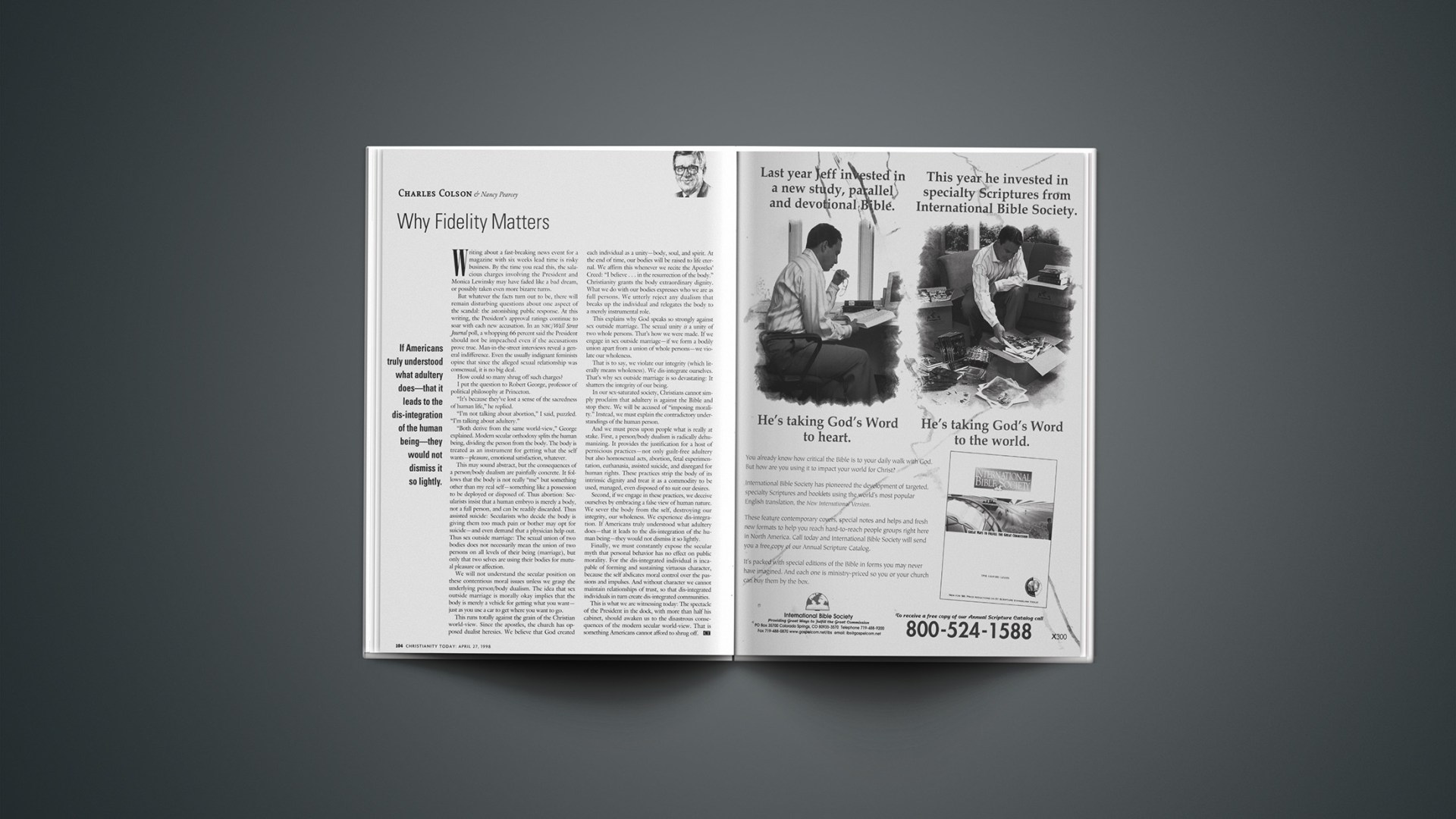Writing about a fast-breaking news event for a magazine with six weeks lead time is risky business. By the time you read this, the salacious charges involving the President and Monica Lewinsky may have faded like a bad dream, or possibly taken even more bizarre turns.
But whatever the facts turn out to be, there will remain disturbing questions about one aspect of the scandal: the astonishing public response. At this writing, the President’s approval ratings continue to soar with each new accusation. In an NBC/Wall Street Journal poll, a whopping 66 percent said the President should not be impeached even if the accusations prove true. Man-in-the-street interviews reveal a general indifference. Even the usually indignant feminists opine that since the alleged sexual relationship was consensual, it is no big deal.
How could so many shrug off such charges?
I put the question to Robert George, professor of political philosophy at Princeton.
“It’s because they’ve lost a sense of the sacredness of human life,” he replied.
“I’m not talking about abortion,” I said, puzzled. “I’m talking about adultery.”
“Both derive from the same world-view,” George explained. Modern secular orthodoxy splits the human being, dividing the person from the body. The body is treated as an instrument for getting what the self wants—pleasure, emotional satisfaction, whatever.
This may sound abstract, but the consequences of a person/body dualism are painfully concrete. It follows that the body is not really “me” but something other than my real self—something like a possession to be deployed or disposed of. Thus abortion: Secularists insist that a human embryo is merely a body, not a full person, and can be readily discarded. Thus assisted suicide: Secularists who decide the body is giving them too much pain or bother may opt for suicide—and even demand that a physician help out. Thus sex outside marriage: The sexual union of two bodies does not necessarily mean the union of two persons on all levels of their being (marriage), but only that two selves are using their bodies for mutual pleasure or affection.
We will not understand the secular position on these contentious moral issues unless we grasp the underlying person/body dualism. The idea that sex outside marriage is morally okay implies that the body is merely a vehicle for getting what you want—just as you use a car to get where you want to go.
This runs totally against the grain of the Christian world-view. Since the apostles, the church has opposed dualist heresies. We believe that God created each individual as a unity—body, soul, and spirit. At the end of time, our bodies will be raised to life eternal. We affirm this whenever we recite the Apostles’ Creed: “I believe … in the resurrection of the body.” Christianity grants the body extraordinary dignity. What we do with our bodies expresses who we are as full persons. We utterly reject any dualism that breaks up the individual and relegates the body to a merely instrumental role.
This explains why God speaks so strongly against sex outside marriage. The sexual unity is a unity of two whole persons. That’s how we were made. If we engage in sex outside marriage—if we form a bodily union apart from a union of whole persons—we violate our wholeness.
That is to say, we violate our integrity (which literally means wholeness). We dis-integrate ourselves. That’s why sex outside marriage is so devastating: It shatters the integrity of our being.
In our sex-saturated society, Christians cannot simply proclaim that adultery is against the Bible and stop there. We will be accused of “imposing morality.” Instead, we must explain the contradictory understandings of the human person.
And we must press upon people what is really at stake. First, a person/body dualism is radically dehumanizing. It provides the justification for a host of pernicious practices—not only guilt-free adultery but also homosexual acts, abortion, fetal experimentation, euthanasia, assisted suicide, and disregard for human rights. These practices strip the body of its intrinsic dignity and treat it as a commodity to be used, managed, even disposed of to suit our desires.
Second, if we engage in these practices, we deceive ourselves by embracing a false view of human nature. We sever the body from the self, destroying our integrity, our wholeness. We experience dis-integration. If Americans truly understood what adultery does—that it leads to the dis-integration of the human being—they would not dismiss it so lightly.
Finally, we must constantly expose the secular myth that personal behavior has no effect on public morality. For the dis-integrated individual is incapable of forming and sustaining virtuous character, because the self abdicates moral control over the passions and impulses. And without character we cannot maintain relationships of trust, so that dis-integrated individuals in turn create dis-integrated communities.
This is what we are witnessing today: The spectacle of the President in the dock, with more than half his cabinet, should awaken us to the disastrous consequences of the modern secular world-view. That is something Americans cannot afford to shrug off.
Copyright © 1998 Christianity Today. Click for reprint information.










